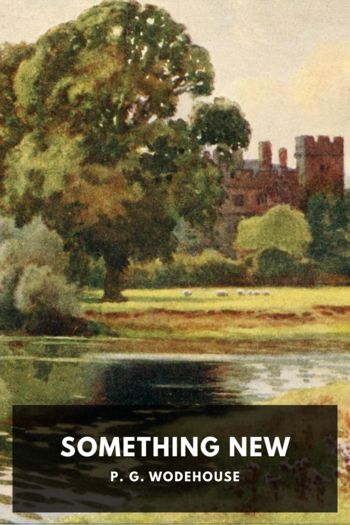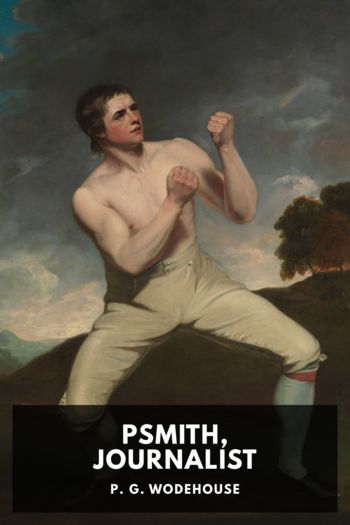Leave It to Psmith by P. G. Wodehouse (best ereader for academics TXT) 📕

- Author: P. G. Wodehouse
Book online «Leave It to Psmith by P. G. Wodehouse (best ereader for academics TXT) 📕». Author P. G. Wodehouse
“No,” said Mr. Cootes.
“Wait a minute while I think,” said Miss Peavey.
There was a pause. Miss Peavey sat with knit brows.
“How would it be … ?” ventured Mr. Cootes.
“Cheese it!” said Miss Peavey.
Mr. Cootes cheesed it. The minutes ticked on.
“I’ve got it,” said Miss Peavey. “This guy’s ace-high with Lady Constance. You’ve got to get him alone right away and tell him he’s got to get you invited to the place as a friend of his.”
“I knew you’d think of something, Liz,” said Mr. Cootes, almost humbly. “You always were a wonder like that. How am I to get him alone?”
“I can fix that. I’ll ask him to come for a stroll with me. He’s not what you’d call crazy about me, but he can’t very well duck if I keep after him. We’ll go down the drive. You’ll be in the bushes—I’ll show you the place. Then I’ll send him to fetch me a wrap or something, and while I walk on he’ll come back past where you’re hiding, and you jump out at him.”
“Liz,” said Mr. Cootes, lost in admiration, “when it comes to doping out a scheme, you’re the snake’s eyebrows!”
“But what are you going to do if he just turns you down?”
Mr. Cootes uttered a bleak laugh, and from the recesses of his costume produced a neat little revolver.
“He won’t turn me down!” he said.
V“Fancy!” said Miss Peavey. “If I had not had a headache and come back early, we should never have had this little chat!”
She gazed up at Psmith in her gentle, wistful way as they started together down the broad gravel drive. A timid, soulful little thing she looked.
“No,” said Psmith.
It was not a gushing reply, but he was not feeling at his sunniest. The idea that Miss Peavey might return from Bridgeford in advance of the main body had not occurred to him. As he would have said himself, he had confused the Unlikely with the Impossible. And the result had been that she had caught him beyond hope of retreat as he sat in his garden-chair and thought of Eve Halliday, who on their return from the lake had been seized with a fresh spasm of conscience and had gone back to the library to put in another hour’s work before dinner. To decline Miss Peavey’s invitation to accompany her down the drive in order to see if there were any signs of those who had been doing honour to the late Hartley Reddish, M.P., had been out of the question. But Psmith, though he went, went without pleasure. Every moment he spent in her society tended to confirm him more and more in the opinion that Miss Peavey was the curse of the species.
“And I have been so longing,” continued his companion, “to have a nice, long talk. All these days I have felt that I haven’t been able to get as near you as I should wish.”
“Well, of course, with the others always about …”
“I meant in a spiritual sense, of course.”
“I see.”
“I wanted so much to discuss your wonderful poetry with you. You haven’t so much as mentioned your work since you came here. Have you!”
“Ah, but, you see, I am trying to keep my mind off it.”
“Really? Why?”
“My medical adviser warned me that I had been concentrating a trifle too much. He offered me the choice, in fact, between a complete rest and the loony-bin.”
“The what, Mr. McTodd?”
“The lunatic asylum, he meant. These medical men express themselves oddly.”
“But surely, then, you ought not to dream of trying to compose if it is as bad as that? And you told Lord Emsworth that you wished to stay at home this afternoon to write a poem.”
Her glance showed nothing but tender solicitude, but inwardly Miss Peavey was telling herself that that would hold him for awhile.
“True,” said Psmith, “true. But you know what Art is. An inexorable mistress. The inspiration came, and I felt that I must take the risk. But it has left me weak, weak.”
“You big stiff!” said Miss Peavey. But not aloud.
They walked on a few steps.
“In fact,” said Psmith, with another inspiration, “I’m not sure I ought not to be going back and resting now.”
Miss Peavey eyed a clump of bushes some dozen yards farther down the drive. They were quivering slightly, as though they sheltered some alien body; and Miss Peavey, whose temper was apt to be impatient, registered a resolve to tell Edward Cootes that, if he couldn’t hide behind a bush without dancing about like a cat on hot bricks, he had better give up his profession and take to selling jellied eels. In which, it may be mentioned, she wronged her old friend. He had been as still as a statue until a moment before, when a large and excitable beetle had fallen down the space between his collar and his neck, an experience which might well have tried the subtlest woodsman.
“Oh, please don’t go in yet,” said Miss Peavey. “It is such a lovely evening. Hark to the music of the breeze in the treetops. So soothing. Like a faraway harp. I wonder if it is whispering secrets to the birds.”
Psmith forbore to follow her into this region of speculation, and they walked past the bushes in silence.
Some little distance farther on, however, Miss Peavey seemed to relent.
“You are looking tired, Mr. McTodd,” she said anxiously. “I am afraid you really have been overtaxing your strength. Perhaps after all you had better go back and lie down.”
“You think so?”
“I am sure of it. I will just stroll on to the gates and see if the car is in sight.”
“I feel that I am deserting you.”
“Oh, please!” said Miss Peavey deprecatingly.
With something of the feelings of a long-sentence convict unexpectedly released immediately on his arrival in jail, Psmith retraced his steps. Glancing over his shoulder, he saw that Miss Peavey had disappeared round a bend in





Comments (0)